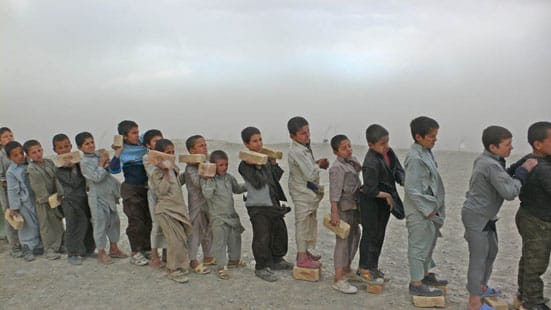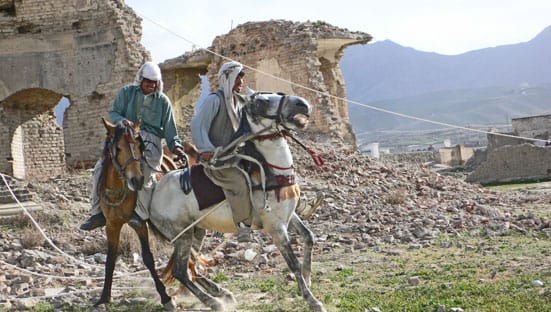Lida
Abdul is an Afghan artist working in performance and video. She is
currently showing in the exhibition 'Illuminations' at Tate Modern.
AM: As a child, you were forced to leave Afghanistan after the
Soviet Invasion and sought refuge in India, Germany and USA...You have
talked about being in a state of 'post-identity', 'post-nation'... How
does your personal history inform your work?
LA: I feel that I can easily cross cultural borders. I think
that is what is wonderful about not having a fixed notion of identity
or nationhood. There is really nothing I have a duty to do. It bothers
people, this refusal to choose between us and them because I guess when
you announce your identity publicly people know what to expect. If I
were to identify with anything, it would be Afghanistan because it's a
country that needs so much attention.
AM: In White House (2005), in a landscape strewn with ruins,
you painstakingly paint the rubble of a destroyed building white. It is
at once an absurdist gesture and a cathartic, determined act of
political resistance. You have said that the most difficult thing is to
move beyond the memory of an event, and your works are the forms of
failed attempts to 'transcend'. Could you say more about this?
LA: I wanted to turn the ruins into sculptures because they carry for
me the memory of something lost, yet at the same time they are
reminders of what is no longer there. A fragment. Yet complete in its
own way because any attempt to fix it, will erase its uniqueness. It
teaches nothing, except that what was once is gone and the only way to
approach it is through art without direct reference to an event.
AM: The austere, battle-scarred landscape of Afghanistan is a central
character in your video work. It has survived decades of war and is
littered with ruins and monuments. How do you relate to this unique
topography?
LA : I've made work in and around the real and imagined
Afghanistan because I knew I had to come to terms with all this stuff
within me. For some people loss becomes a dwelling. So I hope people
see in the piece I've made references not just to Afghanistan but to
the a certain condition, the other side of moving forward fast, the
mute reminder without reference.
AM: How difficult is it for you to make your films in Afghanistan? What practical difficulties do you face?
LA: Its always difficult and possibly dangerous at times to be
out in the country shooting a video, and often I felt very uneasy for
reasons that are too numerous to describe here. But I also get a lot of
support from women and men from all walks of life.
AM: It has been a very exciting couple of years for you, as
your work has been gaining increasing international recognition. You
represented your country at the Venice Biennale in 2005, the first and
only time Afghanistan has been represented, and won the Taiwan Prize.
You've since exhibited at the Sao Paulo Biennial, the Gwanju Biennial,
the Sharjah Biennial, winning the UNESCO prize and at the ( Sharjah
biennale.) You've been created Prince Claus laureate, awarded the Pino
Pascali Prize and are currently nominated for Artes Mundi 3, as well as
participating in exhibitions around the world. What have been your
personal highlights of the last two years?
LA: I am honored to nominated for these prizes and I am
pleased that my work touches people and the work is being seen around
the world. All this wonderful recognition has given me the opportunity
to produce more work.
AM: What projects are you currently working on?
LA: I am working on a two channel video installation/projections side by side of a large lake outside Kabul.
AM: You have described how, for you, art is 'a petition for
another world'. This a beautiful idea, do you believe that art can
truly change the world?
LA: Whatever transformation art has the potential to bring
about cannot be immediately seen. It's an invisible process
simultaneously cathartic and active. I feel that only if people engaged
with one another through their art, culture and music and genuinely
resist trying to reduce the 'other' to what is familiar to themselves,
a lot of change can come about.
AM: Do you feel optimistic that, after a long history of persecution, the situation is improving for artists in Afghanistan?
LA: I think its improving a little. At the same time it will take a
long time for the country to rehabilitate itself from the trauma that
it continues to suffer.
AM

Lida Abdul
Brick Sellers of Kabul, 2006
16mm film tranfer to DVD

Lida Abdul
War Games, 2006
Film transfer to video